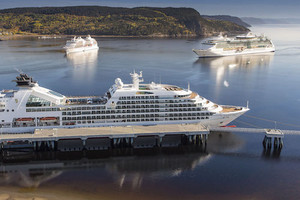
Cruising is undoubtedly one of the most popular ways to holiday for many Australians, with more people recognising that cruising can be exceptional value for money, as well as fun for all the family. If you’re a first time cruiser, however, what key information do you need to know? Here’s part two of our top 20 best tips to help you plan the cruise holiday of your dreams.
Documentation
Check the expiration date of your passport, as many countries require people to travel on one which is valid for at least six months beyond the date of entry. If necessary, renew it early to avoid any problems. When it comes to visas, which may be needed to visit certain countries, whether you need one or not largely depends on the passport you’re travelling on. All cruise lines place the onus of responsibility for visas onto the passenger, however, so do your own research, allow plenty of time for obtaining any visas, and if you need multiple visas consider paying an agency to do the legwork for you.
Work Out Your Budget
Decide what you can afford, and compare this with a fare for a cruise in which you are interested. Be aware, however, that while some mass market cruises appear cheap, when you’re on board you’ll have to pay for “extras” including alternative restaurants, alcohol, soft drinks, specialty coffees, and shore excursions. If you have a large budget, check out all-inclusive fares as many of these additional costs are covered. Some fares are also cruise-only and do not include flights, and if a cruise starts and finishes in different destinations one-way flights may be more expensive.
Shop Around
Once you have decided on a cruise, shop around for the best price, checking with the cruise line directly and travel agencies. Some operators offer benefits including free flights, accommodation upgrades, on board credits and other incentives to lure new customers, so check what’s included in the fare carefully. Also some mass market cruise ships allow you to pre-purchase “packages” for a fixed fee which allow unlimited soft drinks, house beers and house wine, and can save money overall.
Adults Only
If you want to be as far away from kids and teens as possible, whether yours or anyone else’s, consider booking on an adults only ship, going five star or choosing an expedition ship. Another way to avoid junior cruisers is to opt for a mass market ship outside of peak summer periods and school holidays, or choose one which has “adults-only” areas. Riverboats are also a good choice as they are generally don’t have kids on board, younger ones especially, as there are no specific facilities catering to them.
Repositioning Cruises
These are worth considering if you are up for a longer cruise. Essentially they are one-off voyages which move a ship from one region to another, and they can offer many benefits including a reduced fare, a longer itinerary with more sea days, and some unusual destinations en-route. The only snag is that one-way flights are usually involved as the cruise starts and ends in a different place, so you will need to add this to your budget.
Check The Dress Code
Although the dress code has eased considerably with a number of major cruise lines, some ships are still more traditional than others when it comes to what to wear and when. For example, many ships still have formal nights, which require black tie outfits, or elegant nights, which require a smart outfit such as a jacket and tie for men and a cocktail dress for women. If your idea of dressing up is a pair of jeans and a polo shirt, pick a ship without a strict dress code before you book.
Balcony Accommodation
A private balcony will give you a quiet place in which to relax, and enjoy views of the ocean and your ports of call. Not all balconies are equal, however, with some having obstructed views, and some being larger than others. Also brush up on some common balcony etiquette: noise can travel, so be mindful when you are outside early in the morning and late at night; if smoking is allowed, never throw butts or matches off your balcony as they are a potential fire hazard; don’t leave things outside when you’re ship is at sea as they blow away; and if you need to use your mobile phone, don’t speak at the top of your voice.
Shore Excursions
Shore excursions can come with anything from a small to a hefty price tag, so before you book, check the prices for adults, and for children if applicable, and if it is priced in your local currency or US dollars. Also find out what is included so you can plan. For example, if your tour includes a meal, make sure it’s suitable for everyone in your party, and check if any special equipment is provided for tours such as snorkelling or hiking. Also make sure you are fit for an excursion; while one may mostly involve being driven around, another may involve walking or climbing stairs.
Cruise Ship Dining
Make the best dining arrangements to suit you. Some ships operate “fixed seating” or “traditional dining” in their main dining rooms, where you are assigned to a table for the entire cruise, and will eat dinner every night at the same time. If this doesn’t suit, opt for flexible dining if offered. Many ships also offer alternative dining venues, which can be free of charge, or come with a fee and require a reservation. Make reservations before you cruise to avoid missing out, and and consider buying a dining package if available as they can save money. If you have any dietary requirements, check the availability of appropriate foods for your particular problem before you book, and advise the cruise line if you have any food allergies.
Norovirus
Norovirus is a common illness which can affect cruise ships, producing symptoms including nausea, vomiting and diarrhea. It is transmitted in a variety of ways including person-to-person contact, and by way of contaminated surfaces, and food is a common culprit. Use proper hygiene practices when you are on a cruise, which includes washing your hands before eating anywhere, and after using the bathroom, and using the hand sanitisers provided regularly when frequenting public areas, and when coming back from ashore. Also make sure you are properly insured in case you need to visit the doctor.
- By:
- Joanna Hall






